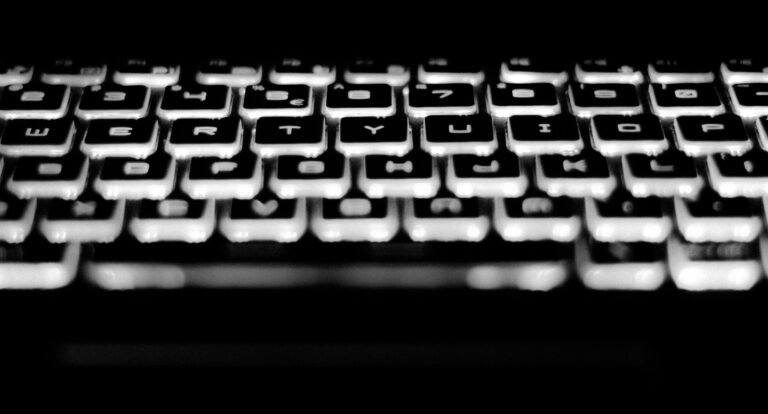Keyboards can last anywhere from 2 to 10 years, depending on the type, usage, and care. The average lifespan of a keyboard is usually around 5 to 10 years, but it can vary significantly based on factors like the material used, the type of switches, and how often it’s used. In this article, we’ll discuss everything you need to know about how long keyboards last, the factors that influence their lifespan, and how to maximize your keyboard’s durability.
How Long Do Keyboards Last?
So, how long do keyboards last? The typical lifespan for a keyboard ranges from 2 to 10 years, depending on its type and how frequently it’s used. Mechanical keyboards, known for their durability and high-quality switches, tend to last longer—often around 10 years or more. Membrane keyboards, on the other hand, are usually less durable and may last between 3 to 5 years before experiencing significant wear.
While most keyboards last several years with proper care, excessive use, spills, and lack of maintenance can shorten their lifespan significantly.

Factors That Affect Keyboard Lifespan
1. Type of Key Switches
The most important factor affecting how long a keyboard lasts is the type of switches it uses. Keyboards generally come in two types of switches: mechanical and membrane.
Mechanical Keyboards: These keyboards are designed to handle millions of key presses. They often last between 10 to 20 years or longer, depending on usage. The key switches in mechanical keyboards are more robust and tend to maintain their tactile feel over time, even with heavy usage.
Membrane Keyboards: These are typically more affordable and quieter than mechanical keyboards. However, they don’t last as long, often requiring replacement within 3 to 5 years of use. The membrane layer can degrade over time, causing keys to become unresponsive or sticky.
2. Build Quality
Higher-quality keyboards are built to last. Keyboards made from sturdy materials such as metal or high-density plastic will last longer than cheaper alternatives that use low-grade plastics. A well-built keyboard can endure thousands of keystrokes without losing its integrity, making it less prone to breaking or developing other issues.
3. Frequency of Use
How often you use your keyboard plays a major role in its longevity. If you’re using your keyboard heavily every day for work or gaming, it may wear out faster. For occasional use, the lifespan is likely to be much longer. Key switches and keycaps wear down with repeated pressing, leading to reduced responsiveness and even complete failure over time.
4. Maintenance and Care
Proper maintenance can significantly extend the life of your keyboard. Keeping your keyboard clean and free from dust, debris, and liquids is crucial. Regularly cleaning the keys and surrounding areas can prevent dust buildup, which can interfere with the switches. For mechanical keyboards, lubricating the switches and stabilizers can prevent unnecessary wear.
Keyboard issues like sticky keys or unresponsive buttons are often the result of neglect, so cleaning your keyboard at least once a month can help you avoid these issues.
5. Environmental Factors
External factors like temperature, humidity, and even exposure to direct sunlight can affect your keyboard’s lifespan. Excessive heat or cold can cause the plastic parts of the keyboard to warp or crack. Spills, particularly from sugary drinks, can damage the internal components and cause malfunction. Keeping your keyboard in a stable environment is essential to prolong its life.
How to Maximize Your Keyboard’s Lifespan
To get the most out of your keyboard, consider the following tips:
Clean Your Keyboard Regularly: Dust, crumbs, and dirt can get stuck between keys and damage the switches. Use compressed air to clean the spaces between keys and wipe the surface with a damp microfiber cloth. For more detailed instructions on how to clean your keyboard, check out our guide on how to clean keyboards
Avoid Eating or Drinking Around Your Keyboard: Spills can cause permanent damage to your keyboard, especially with membrane models. If a spill occurs, turn off the keyboard immediately and clean it thoroughly.
Use Keyboard Covers: If you’re not using your keyboard, cover it to protect it from dust, spills, and dirt.
Consider Keycap Replacement: For mechanical keyboards, replacing keycaps after heavy use can help refresh the look and feel of the keyboard.
Store in a Stable Environment: Avoid placing your keyboard in direct sunlight, high temperatures, or extremely humid environments.
So, how long do keyboards last? The lifespan of a keyboard largely depends on the type of keyboard, frequency of use, and how well it’s maintained. Mechanical keyboards are generally the most durable, lasting anywhere from 10 to 20 years with proper care. Membrane keyboards, while more affordable, usually last 3 to 5 years. To maximize your keyboard’s lifespan, be mindful of how you use and care for it.
By following some simple maintenance tips and choosing the right keyboard type, you can ensure that your keyboard remains functional for years to come.
